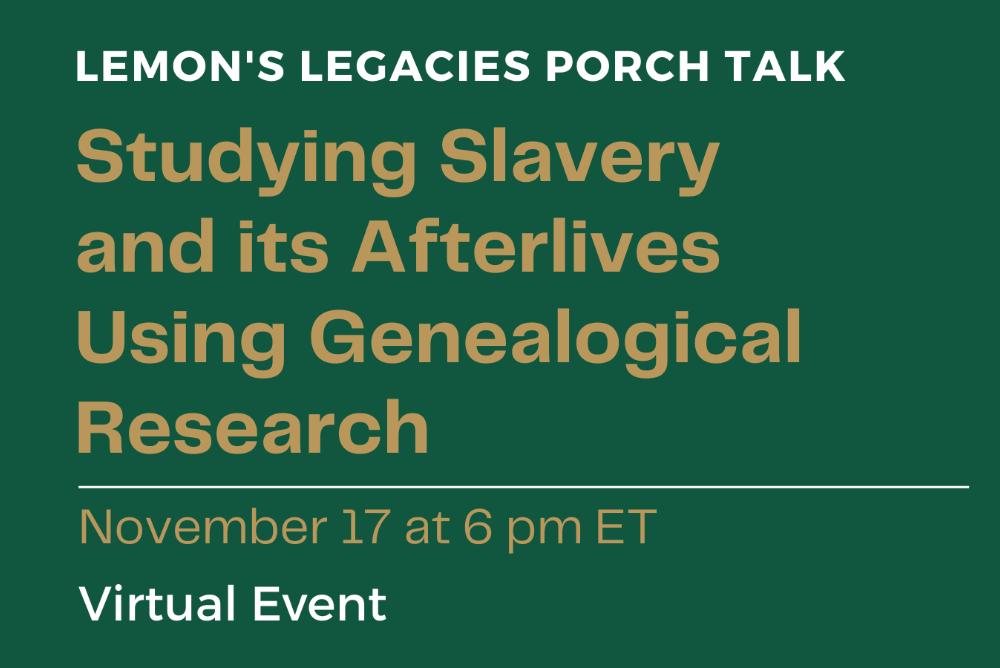W&M Featured Events
[PAST EVENT] Lemon's Legacies Porch Talk: Studying Slavery and its Afterlives Using Genealogical Research
Location
Virtual EventAccess & Features
- Open to the public
- Registration/RSVP

Finding the descendants of enslaved laborers can be challenging due to omissions in the archives of African Americans pre-and post-Civil War. This panel of genealogists and social historians will share about the work they are doing to document enslaved Ancestors connected to three universities, and the similar goals of and approaches to this work. Each genealogy researcher will discuss the progress, successes, and challenges of their particular project. This session will illuminate vital strategies, research collections, resources, and tips for slavery-era research and outreach engagement with descendent communities. As we trace the lives of enslaved and freed people, we discover the past is not so distant. Join us to hear why this research is important as we reckon with our troubled history.
Speakers:
Dr. Jajuan Johnson, a scholar of Africana Studies, is the Mellon Foundation Postdoctoral Fellow with the Lemon Project at William & Mary. He earned a Ph.D. in Heritage Studies from Arkansas State University, and his research focuses broadly on racial violence, gender, sexuality, and religion. Dr. Johnson researches William & Mary's ties to slavery and its afterlives. Using the genealogical research method, he works collaboratively with descendants and relatives to make ancestral connections to persons enslaved by the university or its associates. Dr. Johnson is published in Ethnohistory, Southern Cultures, and the Arkansas Review: A Journal of Delta Studies.
Dr. Shelley V. Murphy: As the Descendant Project Researcher, Dr. Murphy’s position with the University of Virginia is to conduct genealogical research and locate descendants of the free and enslaved laborers who helped to build the university for Thomas Jefferson. She was provided a list compiled by the university from the financial ledgers from 1817-1870. The financial ledgers documented where the university paid for labor services. The list was a compilation of data which includes the date of the service, name of the slave holder or who had permission to rent the enslaved laborer to the university, status of the laborer if free or enslaved, occupation/duties, the dollar amount paid to the slave holder, and where the information was taken from. It is evident there will be challenges when researching African Americans throughout the slave era. The “list” does not always include all of the much-needed data to ensure a successful outcome of finding a descendant. There are several unknown slave holders and unknown laborers, no location of the slave holder or the free or enslaved laborers, no age is referenced for the laborers as well as numerous laborers are listed by a first name only. Dr. Murphy will present her findings, which will include the challenges and successes of finding the laborers and their descendants.
Renate Yarborough Sanders, Genealogist, Wake Forest University Descendant Project Researcher: Renate Yarborough Sanders, a nationally recognized speaker, authors two genealogy blogs and an online funeral programs database. She is a member of multiple genealogical organizations, holding leadership roles within several. Renate cohosts “Let’s Talk North Carolina Genealogy,” an online platform presenting genealogy programing focused on North Carolina research. She has provided genealogical education for Mount Vernon, Norfolk State University, William & Mary and NASA. Ms. Sanders’ research has been featured on PBS, Blog Talk Radio, and in National Geographic. Renate is currently working to identify descendants of enslaved individuals who were sold to benefit an endowment for Wake Forest University.
Contact
Sarah Thomas, [[setho2]]
